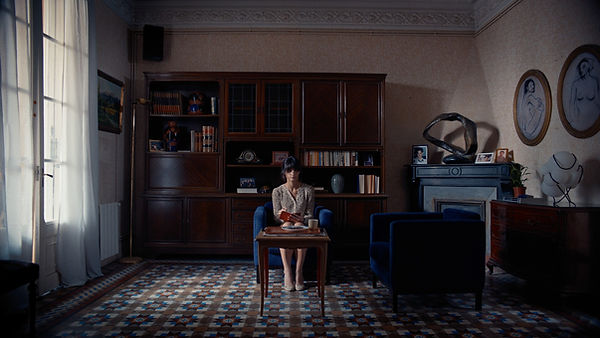
Interview
Antón Tendero
Antón Tendero is a filmmaker whose work gravitates toward the fractures and ambiguities within human relationships. In De Rodillas, awarded Best Drama Short at the BR Banshee Festival, he confronts themes such as gaslighting, domination, and the slow erosion of intimacy, blending dramatic weight with moments of dark satire. For the first time, he collaborated with a professional team, after years of resource-scarce projects shaped by pressure, improvisation, and independence. His approach resists obvious meaning, favoring silence, blocking, and the audience’s own recognition of lived experience. Tendero sees no divide between the personal and the social: relationships are marked by pride, fear, status, and the influences of media, all of which appear in his narratives. With three feature scripts already written, he continues to pursue stories shaped by fear, desire, and the contradictions of communication.

BRB: To start, could you introduce yourself to our readers and share a bit about how you discovered your voice as a filmmaker?
I can’t. We change, so does our voice. The simple answer would be practice, and I really mean it, it's all about wondering what can you tell.
BRB: Your film De Rodillas won Best Drama Short. How does it feel to have your work recognized in this way?
I want to be honest, it’s strange. But underneath the language used to tell the story there is a desperate broken marriage... so I’m glad you didn’t narrow it into one layer!
BRB: De Rodillas explores the decay of a marriage with both dramatic and satirical elements. What inspired you to tell a story about such a complex and intimate conflict?
Relationships are often understood as a way to obtain something in exchange of loving someone. Sometimes it’s like running after something you don’t even know if exists, but apparently, you want it. Sociologist Zigmund Bauman talks about it in Liquid Love, it’s a clear and interesting current read.
Also, most of the parents of my generation are divorced, so I was wondering "what if pride and social status didn't allow you to do it?"
BRB: You mentioned that this is your first short film made with a professional team. How did this experience differ from your previous independent, resource-scarce projects?
Pressure. And the pleasure of having professionals you know you can trust when it's time to rely on them.
BRB: The themes of gaslighting, domination, and emotional decay are central in De Rodillas. How did you approach portraying such intense dynamics authentically on screen?
I don’t appreciate much when something relays on obvious meaning. It can be explicit, but not obvious. Meaning it’s not as relevant as the experience itself. Let the people find it, let them recognize what they already know from life.
BRB: In your director statement, you describe the tension between loneliness and living with someone. How did you translate these psychological complexities visually and narratively?
Through blocking and silence. Good actors give you that.
BRB: Given your experience with low-budget filmmaking, what was the biggest challenge in scaling up to a professional production while keeping your vision intact?
There are many answers to that, one is that you have to remain conscious about how specific details affect abstract themes as a whole. Those two are directly connected.
BRB: Two characters in De Rodillas experience clashing interpretations of reality. How do you approach directing actors to convey subtle but powerful emotional conflicts?
As I was saying, emotions are repressed because of social constructs. It’s almost a need to suppress them but they remain, as if they are inevitable, which they are. Restrain even the consequent reactions to that silence, they will appear anyways.
BRB: Do you see De Rodillas as a story reflecting broader societal issues about marriage and communication, or as a deeply personal exploration of relationships?
They’re not opposites, neither exclusive. People give meaning to everything through their personal perspective, even deeply subconsciously. At the same time, social issues affect the way everything it’s perceived, through the effect of direct consequences or through the influence that the media inflicts when it’s presented to the mass.
BRB: Which filmmakers, films, or artistic influences have most shaped your approach to drama and storytelling?
I was hoping this question didn’t appear. I like good films. I don’t think some names will change anything.
BRB: How do you balance dramatic tension and moments of dark satire in your work without tipping into melodrama?
Put a little too much and you are falling into television domains. Put less and you're telling nothing. To be true I don't know what I’m going to do half of the time, I just find it when I see something I don't like, and I'm pretty good at that.
BRB: Looking ahead, what kind of stories or themes do you dream of exploring next, and do you see yourself staying in short films or moving into features?
Well... dreams it's one of them. Communication it's the whole point of narrating, so there's another. Fear, desire, I guess everything that shapes our behavior. I have three features written and there's a bit of those in each one of them.

